Organizational Culture, Effectiveness, and Success: A Detailed Report
VerifiedAdded on 2022/12/01
|10
|3028
|97
Report
AI Summary
This report delves into the realm of organizational behavior, examining the crucial role of organizational culture in shaping employee motivation, organizational effectiveness, and overall business success. It begins by introducing the concept of organizational culture and utilizes Edgar Schein's model to identify and explain the different levels of culture within an organization, including artifacts, values, and underlying assumptions. The report then explores how a positive organizational culture can enhance innovation, promote common goals, improve employee retention, foster diversity, and maintain checks and balances. It further investigates the impact of culture on employee motivation, highlighting factors such as play, purpose, potential, emotional and economic pressures, and inertia. Finally, the report emphasizes the direct link between organizational culture and business success, discussing the importance of adaptability, involvement, clear mission, and consistency. The report concludes by underscoring the influence of managers on shaping organizational culture and its impact on achieving company goals.
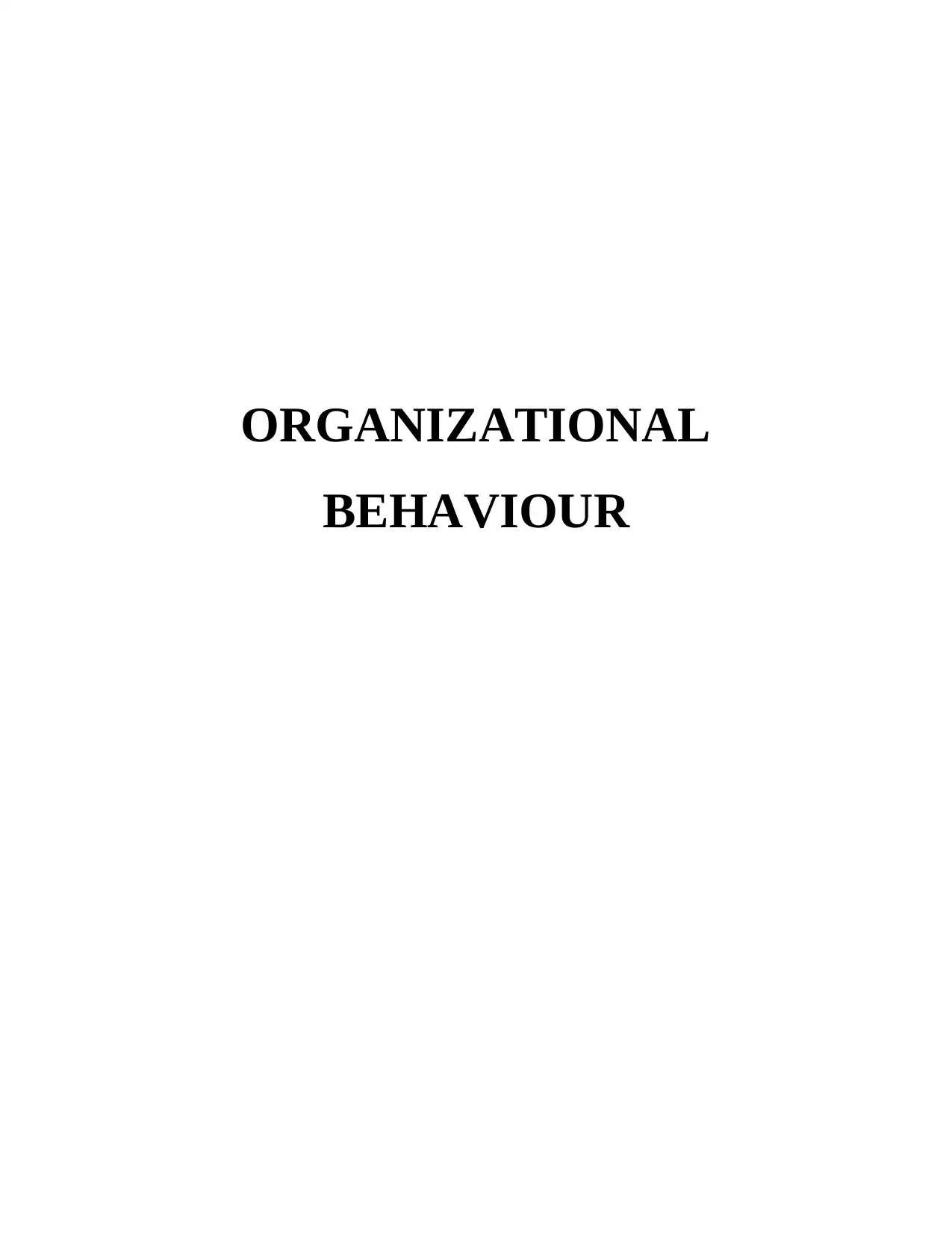
ORGANIZATIONAL
BEHAVIOUR
BEHAVIOUR
Paraphrase This Document
Need a fresh take? Get an instant paraphrase of this document with our AI Paraphraser
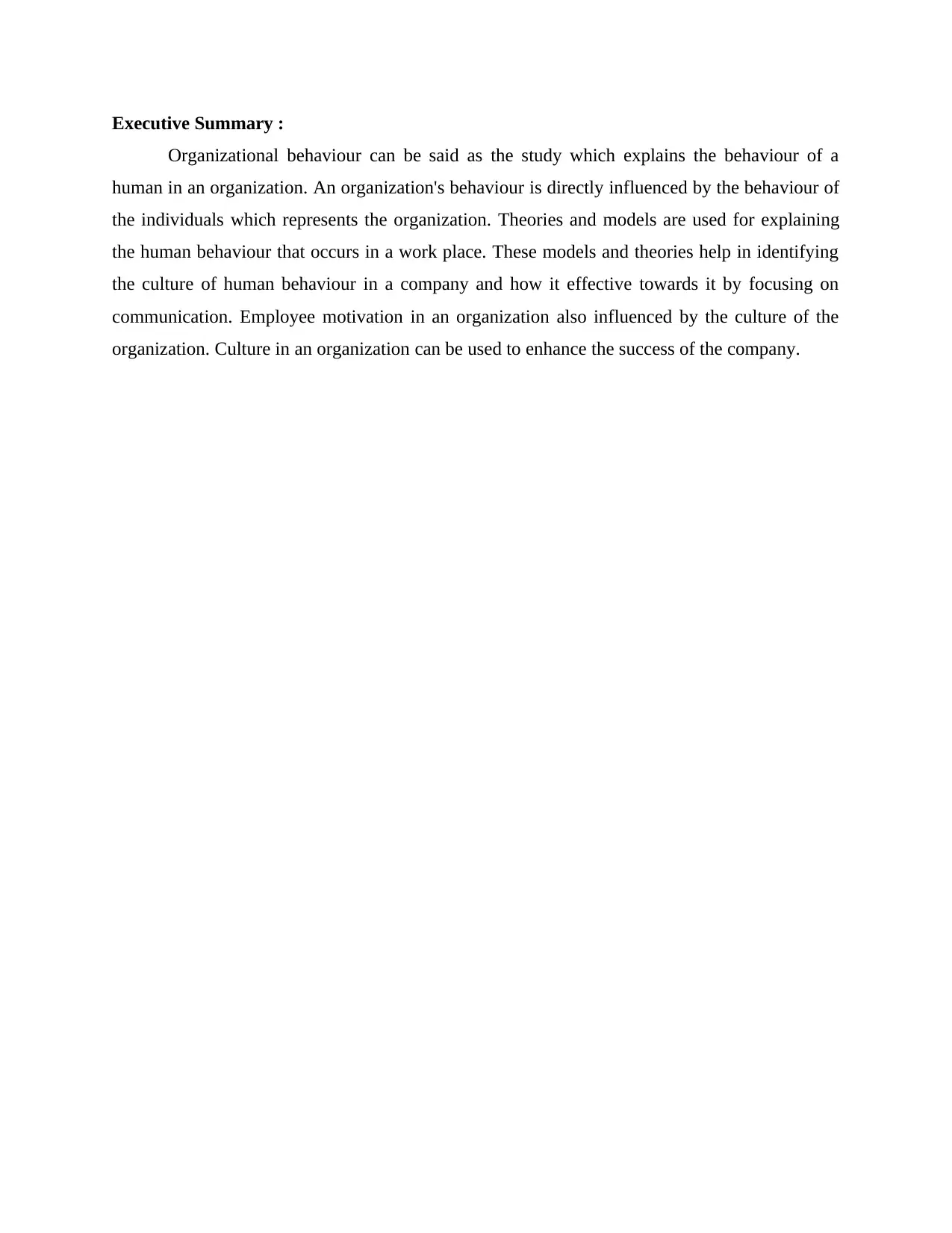
Executive Summary :
Organizational behaviour can be said as the study which explains the behaviour of a
human in an organization. An organization's behaviour is directly influenced by the behaviour of
the individuals which represents the organization. Theories and models are used for explaining
the human behaviour that occurs in a work place. These models and theories help in identifying
the culture of human behaviour in a company and how it effective towards it by focusing on
communication. Employee motivation in an organization also influenced by the culture of the
organization. Culture in an organization can be used to enhance the success of the company.
Organizational behaviour can be said as the study which explains the behaviour of a
human in an organization. An organization's behaviour is directly influenced by the behaviour of
the individuals which represents the organization. Theories and models are used for explaining
the human behaviour that occurs in a work place. These models and theories help in identifying
the culture of human behaviour in a company and how it effective towards it by focusing on
communication. Employee motivation in an organization also influenced by the culture of the
organization. Culture in an organization can be used to enhance the success of the company.
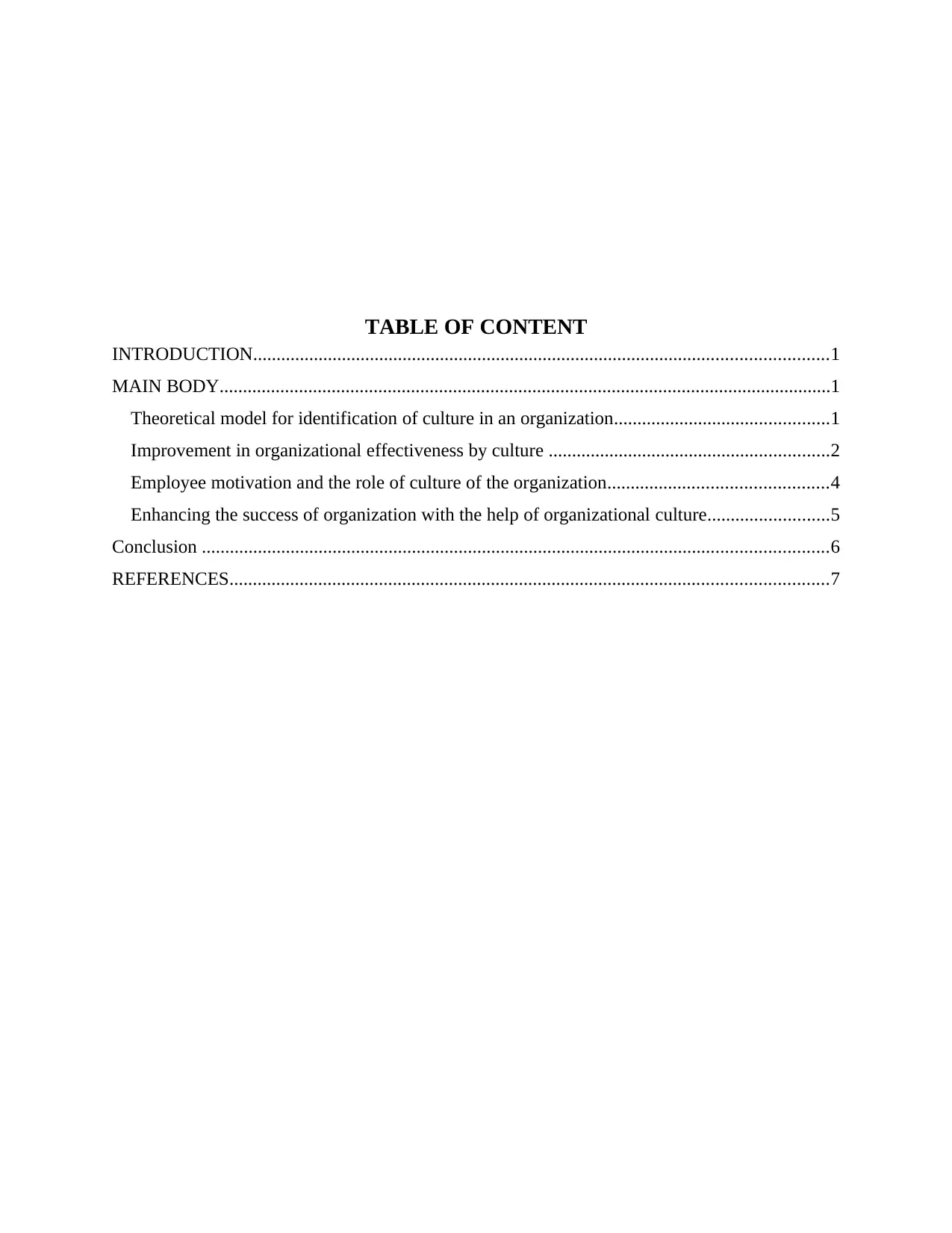
TABLE OF CONTENT
INTRODUCTION...........................................................................................................................1
MAIN BODY...................................................................................................................................1
Theoretical model for identification of culture in an organization..............................................1
Improvement in organizational effectiveness by culture ............................................................2
Employee motivation and the role of culture of the organization...............................................4
Enhancing the success of organization with the help of organizational culture..........................5
Conclusion ......................................................................................................................................6
REFERENCES................................................................................................................................7
INTRODUCTION...........................................................................................................................1
MAIN BODY...................................................................................................................................1
Theoretical model for identification of culture in an organization..............................................1
Improvement in organizational effectiveness by culture ............................................................2
Employee motivation and the role of culture of the organization...............................................4
Enhancing the success of organization with the help of organizational culture..........................5
Conclusion ......................................................................................................................................6
REFERENCES................................................................................................................................7
⊘ This is a preview!⊘
Do you want full access?
Subscribe today to unlock all pages.

Trusted by 1+ million students worldwide
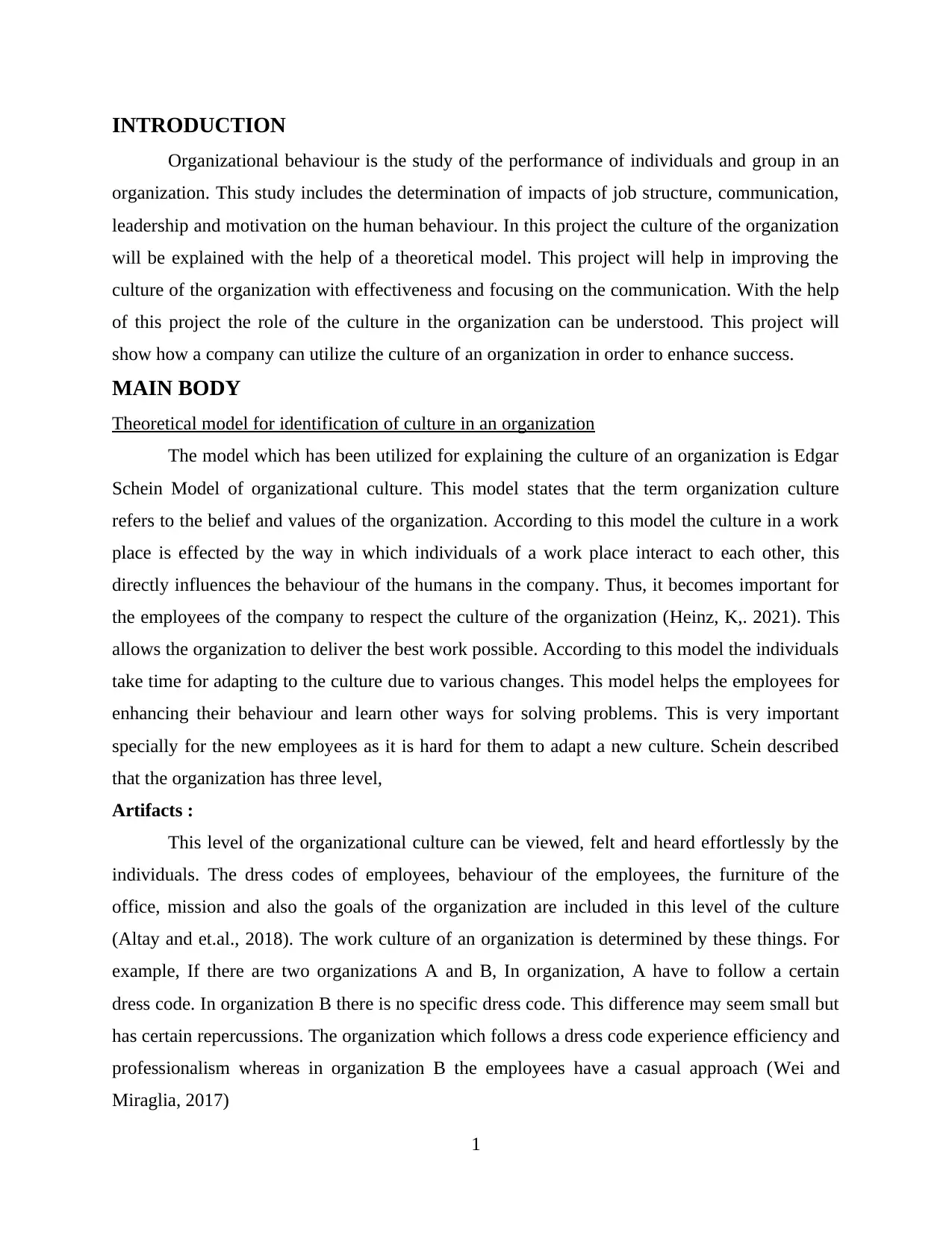
INTRODUCTION
Organizational behaviour is the study of the performance of individuals and group in an
organization. This study includes the determination of impacts of job structure, communication,
leadership and motivation on the human behaviour. In this project the culture of the organization
will be explained with the help of a theoretical model. This project will help in improving the
culture of the organization with effectiveness and focusing on the communication. With the help
of this project the role of the culture in the organization can be understood. This project will
show how a company can utilize the culture of an organization in order to enhance success.
MAIN BODY
Theoretical model for identification of culture in an organization
The model which has been utilized for explaining the culture of an organization is Edgar
Schein Model of organizational culture. This model states that the term organization culture
refers to the belief and values of the organization. According to this model the culture in a work
place is effected by the way in which individuals of a work place interact to each other, this
directly influences the behaviour of the humans in the company. Thus, it becomes important for
the employees of the company to respect the culture of the organization (Heinz, K,. 2021). This
allows the organization to deliver the best work possible. According to this model the individuals
take time for adapting to the culture due to various changes. This model helps the employees for
enhancing their behaviour and learn other ways for solving problems. This is very important
specially for the new employees as it is hard for them to adapt a new culture. Schein described
that the organization has three level,
Artifacts :
This level of the organizational culture can be viewed, felt and heard effortlessly by the
individuals. The dress codes of employees, behaviour of the employees, the furniture of the
office, mission and also the goals of the organization are included in this level of the culture
(Altay and et.al., 2018). The work culture of an organization is determined by these things. For
example, If there are two organizations A and B, In organization, A have to follow a certain
dress code. In organization B there is no specific dress code. This difference may seem small but
has certain repercussions. The organization which follows a dress code experience efficiency and
professionalism whereas in organization B the employees have a casual approach (Wei and
Miraglia, 2017)
1
Organizational behaviour is the study of the performance of individuals and group in an
organization. This study includes the determination of impacts of job structure, communication,
leadership and motivation on the human behaviour. In this project the culture of the organization
will be explained with the help of a theoretical model. This project will help in improving the
culture of the organization with effectiveness and focusing on the communication. With the help
of this project the role of the culture in the organization can be understood. This project will
show how a company can utilize the culture of an organization in order to enhance success.
MAIN BODY
Theoretical model for identification of culture in an organization
The model which has been utilized for explaining the culture of an organization is Edgar
Schein Model of organizational culture. This model states that the term organization culture
refers to the belief and values of the organization. According to this model the culture in a work
place is effected by the way in which individuals of a work place interact to each other, this
directly influences the behaviour of the humans in the company. Thus, it becomes important for
the employees of the company to respect the culture of the organization (Heinz, K,. 2021). This
allows the organization to deliver the best work possible. According to this model the individuals
take time for adapting to the culture due to various changes. This model helps the employees for
enhancing their behaviour and learn other ways for solving problems. This is very important
specially for the new employees as it is hard for them to adapt a new culture. Schein described
that the organization has three level,
Artifacts :
This level of the organizational culture can be viewed, felt and heard effortlessly by the
individuals. The dress codes of employees, behaviour of the employees, the furniture of the
office, mission and also the goals of the organization are included in this level of the culture
(Altay and et.al., 2018). The work culture of an organization is determined by these things. For
example, If there are two organizations A and B, In organization, A have to follow a certain
dress code. In organization B there is no specific dress code. This difference may seem small but
has certain repercussions. The organization which follows a dress code experience efficiency and
professionalism whereas in organization B the employees have a casual approach (Wei and
Miraglia, 2017)
1
Paraphrase This Document
Need a fresh take? Get an instant paraphrase of this document with our AI Paraphraser
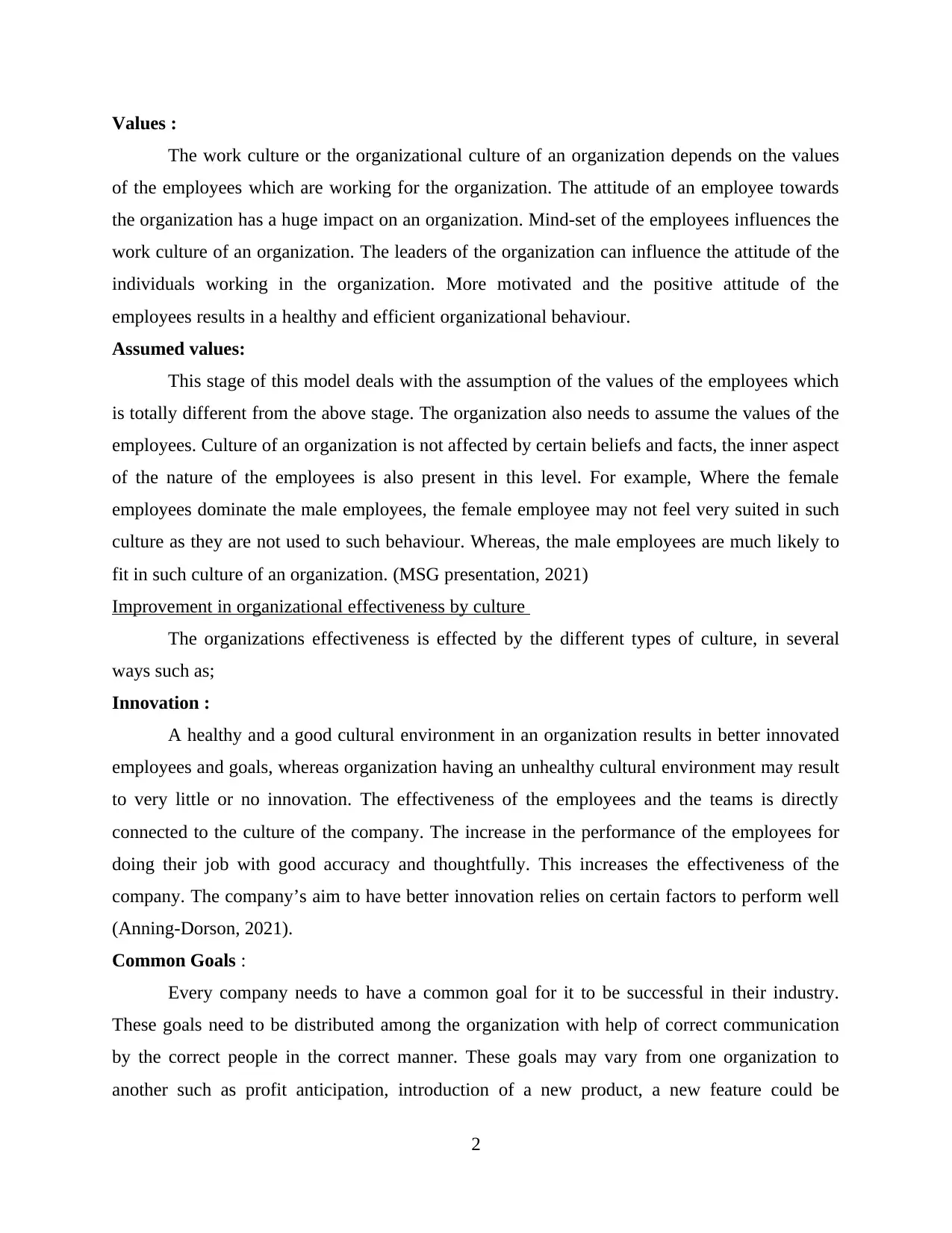
Values :
The work culture or the organizational culture of an organization depends on the values
of the employees which are working for the organization. The attitude of an employee towards
the organization has a huge impact on an organization. Mind-set of the employees influences the
work culture of an organization. The leaders of the organization can influence the attitude of the
individuals working in the organization. More motivated and the positive attitude of the
employees results in a healthy and efficient organizational behaviour.
Assumed values:
This stage of this model deals with the assumption of the values of the employees which
is totally different from the above stage. The organization also needs to assume the values of the
employees. Culture of an organization is not affected by certain beliefs and facts, the inner aspect
of the nature of the employees is also present in this level. For example, Where the female
employees dominate the male employees, the female employee may not feel very suited in such
culture as they are not used to such behaviour. Whereas, the male employees are much likely to
fit in such culture of an organization. (MSG presentation, 2021)
Improvement in organizational effectiveness by culture
The organizations effectiveness is effected by the different types of culture, in several
ways such as;
Innovation :
A healthy and a good cultural environment in an organization results in better innovated
employees and goals, whereas organization having an unhealthy cultural environment may result
to very little or no innovation. The effectiveness of the employees and the teams is directly
connected to the culture of the company. The increase in the performance of the employees for
doing their job with good accuracy and thoughtfully. This increases the effectiveness of the
company. The company’s aim to have better innovation relies on certain factors to perform well
(Anning-Dorson, 2021).
Common Goals :
Every company needs to have a common goal for it to be successful in their industry.
These goals need to be distributed among the organization with help of correct communication
by the correct people in the correct manner. These goals may vary from one organization to
another such as profit anticipation, introduction of a new product, a new feature could be
2
The work culture or the organizational culture of an organization depends on the values
of the employees which are working for the organization. The attitude of an employee towards
the organization has a huge impact on an organization. Mind-set of the employees influences the
work culture of an organization. The leaders of the organization can influence the attitude of the
individuals working in the organization. More motivated and the positive attitude of the
employees results in a healthy and efficient organizational behaviour.
Assumed values:
This stage of this model deals with the assumption of the values of the employees which
is totally different from the above stage. The organization also needs to assume the values of the
employees. Culture of an organization is not affected by certain beliefs and facts, the inner aspect
of the nature of the employees is also present in this level. For example, Where the female
employees dominate the male employees, the female employee may not feel very suited in such
culture as they are not used to such behaviour. Whereas, the male employees are much likely to
fit in such culture of an organization. (MSG presentation, 2021)
Improvement in organizational effectiveness by culture
The organizations effectiveness is effected by the different types of culture, in several
ways such as;
Innovation :
A healthy and a good cultural environment in an organization results in better innovated
employees and goals, whereas organization having an unhealthy cultural environment may result
to very little or no innovation. The effectiveness of the employees and the teams is directly
connected to the culture of the company. The increase in the performance of the employees for
doing their job with good accuracy and thoughtfully. This increases the effectiveness of the
company. The company’s aim to have better innovation relies on certain factors to perform well
(Anning-Dorson, 2021).
Common Goals :
Every company needs to have a common goal for it to be successful in their industry.
These goals need to be distributed among the organization with help of correct communication
by the correct people in the correct manner. These goals may vary from one organization to
another such as profit anticipation, introduction of a new product, a new feature could be
2
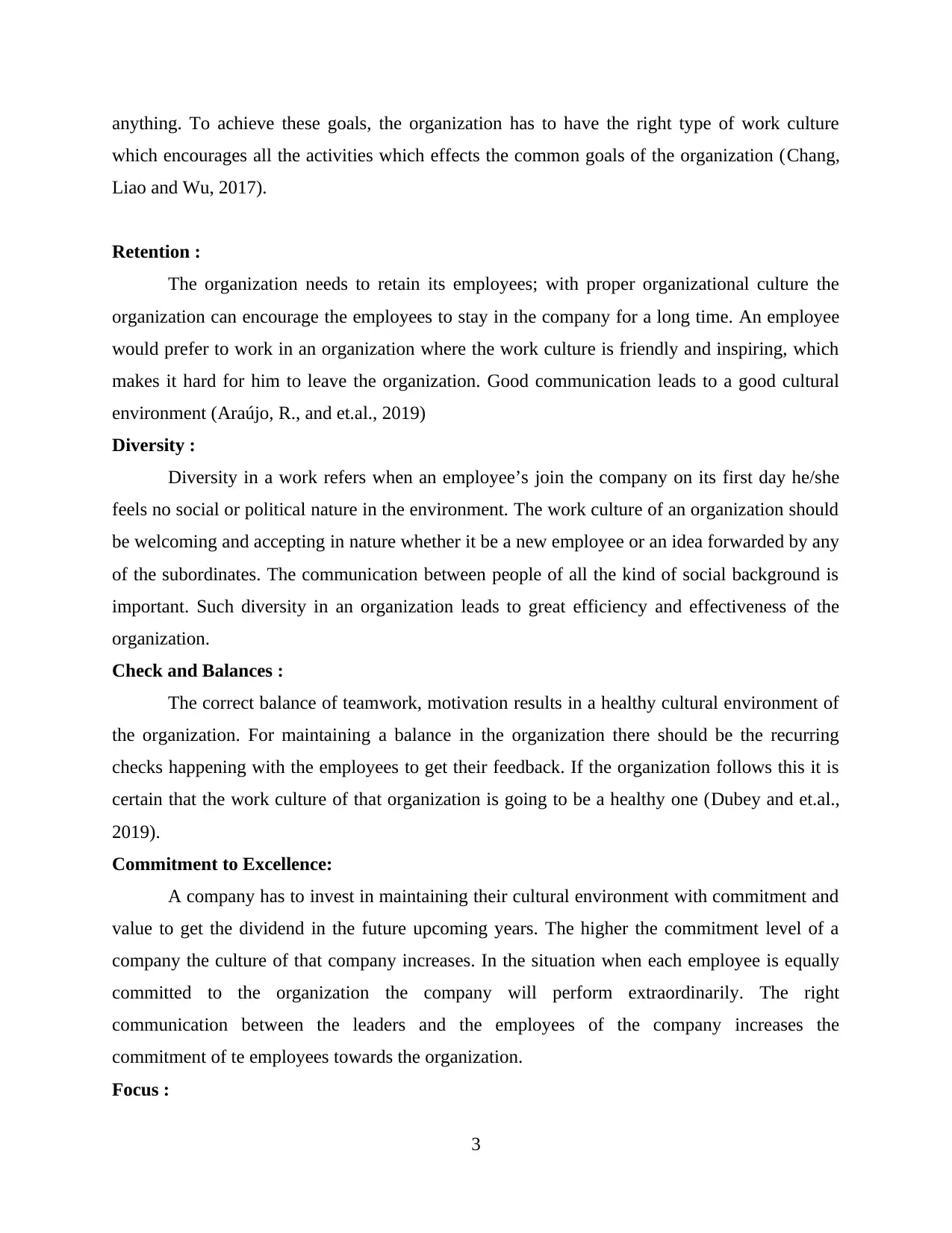
anything. To achieve these goals, the organization has to have the right type of work culture
which encourages all the activities which effects the common goals of the organization (Chang,
Liao and Wu, 2017).
Retention :
The organization needs to retain its employees; with proper organizational culture the
organization can encourage the employees to stay in the company for a long time. An employee
would prefer to work in an organization where the work culture is friendly and inspiring, which
makes it hard for him to leave the organization. Good communication leads to a good cultural
environment (Araújo, R., and et.al., 2019)
Diversity :
Diversity in a work refers when an employee’s join the company on its first day he/she
feels no social or political nature in the environment. The work culture of an organization should
be welcoming and accepting in nature whether it be a new employee or an idea forwarded by any
of the subordinates. The communication between people of all the kind of social background is
important. Such diversity in an organization leads to great efficiency and effectiveness of the
organization.
Check and Balances :
The correct balance of teamwork, motivation results in a healthy cultural environment of
the organization. For maintaining a balance in the organization there should be the recurring
checks happening with the employees to get their feedback. If the organization follows this it is
certain that the work culture of that organization is going to be a healthy one (Dubey and et.al.,
2019).
Commitment to Excellence:
A company has to invest in maintaining their cultural environment with commitment and
value to get the dividend in the future upcoming years. The higher the commitment level of a
company the culture of that company increases. In the situation when each employee is equally
committed to the organization the company will perform extraordinarily. The right
communication between the leaders and the employees of the company increases the
commitment of te employees towards the organization.
Focus :
3
which encourages all the activities which effects the common goals of the organization (Chang,
Liao and Wu, 2017).
Retention :
The organization needs to retain its employees; with proper organizational culture the
organization can encourage the employees to stay in the company for a long time. An employee
would prefer to work in an organization where the work culture is friendly and inspiring, which
makes it hard for him to leave the organization. Good communication leads to a good cultural
environment (Araújo, R., and et.al., 2019)
Diversity :
Diversity in a work refers when an employee’s join the company on its first day he/she
feels no social or political nature in the environment. The work culture of an organization should
be welcoming and accepting in nature whether it be a new employee or an idea forwarded by any
of the subordinates. The communication between people of all the kind of social background is
important. Such diversity in an organization leads to great efficiency and effectiveness of the
organization.
Check and Balances :
The correct balance of teamwork, motivation results in a healthy cultural environment of
the organization. For maintaining a balance in the organization there should be the recurring
checks happening with the employees to get their feedback. If the organization follows this it is
certain that the work culture of that organization is going to be a healthy one (Dubey and et.al.,
2019).
Commitment to Excellence:
A company has to invest in maintaining their cultural environment with commitment and
value to get the dividend in the future upcoming years. The higher the commitment level of a
company the culture of that company increases. In the situation when each employee is equally
committed to the organization the company will perform extraordinarily. The right
communication between the leaders and the employees of the company increases the
commitment of te employees towards the organization.
Focus :
3
⊘ This is a preview!⊘
Do you want full access?
Subscribe today to unlock all pages.

Trusted by 1+ million students worldwide
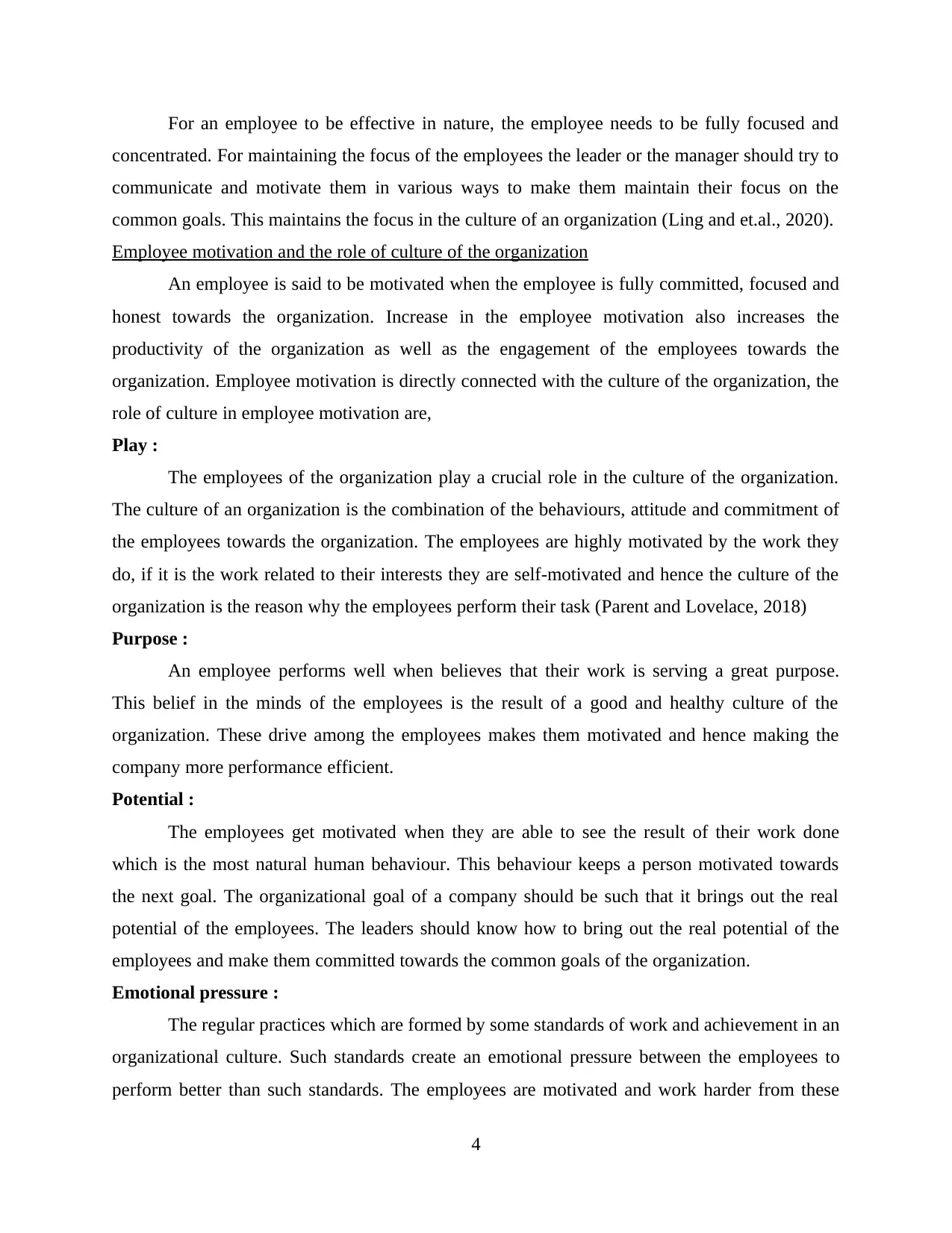
For an employee to be effective in nature, the employee needs to be fully focused and
concentrated. For maintaining the focus of the employees the leader or the manager should try to
communicate and motivate them in various ways to make them maintain their focus on the
common goals. This maintains the focus in the culture of an organization (Ling and et.al., 2020).
Employee motivation and the role of culture of the organization
An employee is said to be motivated when the employee is fully committed, focused and
honest towards the organization. Increase in the employee motivation also increases the
productivity of the organization as well as the engagement of the employees towards the
organization. Employee motivation is directly connected with the culture of the organization, the
role of culture in employee motivation are,
Play :
The employees of the organization play a crucial role in the culture of the organization.
The culture of an organization is the combination of the behaviours, attitude and commitment of
the employees towards the organization. The employees are highly motivated by the work they
do, if it is the work related to their interests they are self-motivated and hence the culture of the
organization is the reason why the employees perform their task (Parent and Lovelace, 2018)
Purpose :
An employee performs well when believes that their work is serving a great purpose.
This belief in the minds of the employees is the result of a good and healthy culture of the
organization. These drive among the employees makes them motivated and hence making the
company more performance efficient.
Potential :
The employees get motivated when they are able to see the result of their work done
which is the most natural human behaviour. This behaviour keeps a person motivated towards
the next goal. The organizational goal of a company should be such that it brings out the real
potential of the employees. The leaders should know how to bring out the real potential of the
employees and make them committed towards the common goals of the organization.
Emotional pressure :
The regular practices which are formed by some standards of work and achievement in an
organizational culture. Such standards create an emotional pressure between the employees to
perform better than such standards. The employees are motivated and work harder from these
4
concentrated. For maintaining the focus of the employees the leader or the manager should try to
communicate and motivate them in various ways to make them maintain their focus on the
common goals. This maintains the focus in the culture of an organization (Ling and et.al., 2020).
Employee motivation and the role of culture of the organization
An employee is said to be motivated when the employee is fully committed, focused and
honest towards the organization. Increase in the employee motivation also increases the
productivity of the organization as well as the engagement of the employees towards the
organization. Employee motivation is directly connected with the culture of the organization, the
role of culture in employee motivation are,
Play :
The employees of the organization play a crucial role in the culture of the organization.
The culture of an organization is the combination of the behaviours, attitude and commitment of
the employees towards the organization. The employees are highly motivated by the work they
do, if it is the work related to their interests they are self-motivated and hence the culture of the
organization is the reason why the employees perform their task (Parent and Lovelace, 2018)
Purpose :
An employee performs well when believes that their work is serving a great purpose.
This belief in the minds of the employees is the result of a good and healthy culture of the
organization. These drive among the employees makes them motivated and hence making the
company more performance efficient.
Potential :
The employees get motivated when they are able to see the result of their work done
which is the most natural human behaviour. This behaviour keeps a person motivated towards
the next goal. The organizational goal of a company should be such that it brings out the real
potential of the employees. The leaders should know how to bring out the real potential of the
employees and make them committed towards the common goals of the organization.
Emotional pressure :
The regular practices which are formed by some standards of work and achievement in an
organizational culture. Such standards create an emotional pressure between the employees to
perform better than such standards. The employees are motivated and work harder from these
4
Paraphrase This Document
Need a fresh take? Get an instant paraphrase of this document with our AI Paraphraser
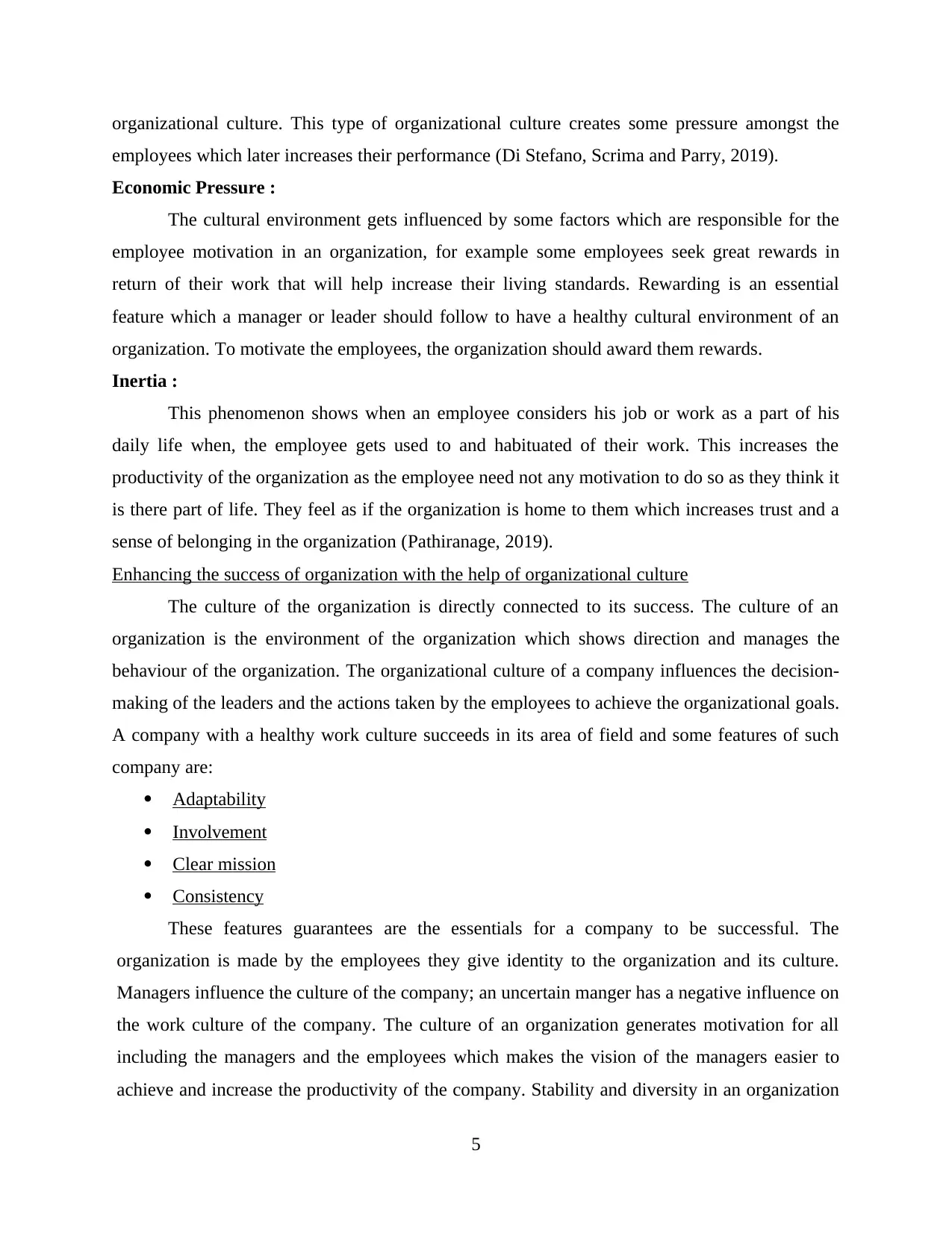
organizational culture. This type of organizational culture creates some pressure amongst the
employees which later increases their performance (Di Stefano, Scrima and Parry, 2019).
Economic Pressure :
The cultural environment gets influenced by some factors which are responsible for the
employee motivation in an organization, for example some employees seek great rewards in
return of their work that will help increase their living standards. Rewarding is an essential
feature which a manager or leader should follow to have a healthy cultural environment of an
organization. To motivate the employees, the organization should award them rewards.
Inertia :
This phenomenon shows when an employee considers his job or work as a part of his
daily life when, the employee gets used to and habituated of their work. This increases the
productivity of the organization as the employee need not any motivation to do so as they think it
is there part of life. They feel as if the organization is home to them which increases trust and a
sense of belonging in the organization (Pathiranage, 2019).
Enhancing the success of organization with the help of organizational culture
The culture of the organization is directly connected to its success. The culture of an
organization is the environment of the organization which shows direction and manages the
behaviour of the organization. The organizational culture of a company influences the decision-
making of the leaders and the actions taken by the employees to achieve the organizational goals.
A company with a healthy work culture succeeds in its area of field and some features of such
company are:
Adaptability
Involvement
Clear mission
Consistency
These features guarantees are the essentials for a company to be successful. The
organization is made by the employees they give identity to the organization and its culture.
Managers influence the culture of the company; an uncertain manger has a negative influence on
the work culture of the company. The culture of an organization generates motivation for all
including the managers and the employees which makes the vision of the managers easier to
achieve and increase the productivity of the company. Stability and diversity in an organization
5
employees which later increases their performance (Di Stefano, Scrima and Parry, 2019).
Economic Pressure :
The cultural environment gets influenced by some factors which are responsible for the
employee motivation in an organization, for example some employees seek great rewards in
return of their work that will help increase their living standards. Rewarding is an essential
feature which a manager or leader should follow to have a healthy cultural environment of an
organization. To motivate the employees, the organization should award them rewards.
Inertia :
This phenomenon shows when an employee considers his job or work as a part of his
daily life when, the employee gets used to and habituated of their work. This increases the
productivity of the organization as the employee need not any motivation to do so as they think it
is there part of life. They feel as if the organization is home to them which increases trust and a
sense of belonging in the organization (Pathiranage, 2019).
Enhancing the success of organization with the help of organizational culture
The culture of the organization is directly connected to its success. The culture of an
organization is the environment of the organization which shows direction and manages the
behaviour of the organization. The organizational culture of a company influences the decision-
making of the leaders and the actions taken by the employees to achieve the organizational goals.
A company with a healthy work culture succeeds in its area of field and some features of such
company are:
Adaptability
Involvement
Clear mission
Consistency
These features guarantees are the essentials for a company to be successful. The
organization is made by the employees they give identity to the organization and its culture.
Managers influence the culture of the company; an uncertain manger has a negative influence on
the work culture of the company. The culture of an organization generates motivation for all
including the managers and the employees which makes the vision of the managers easier to
achieve and increase the productivity of the company. Stability and diversity in an organization
5
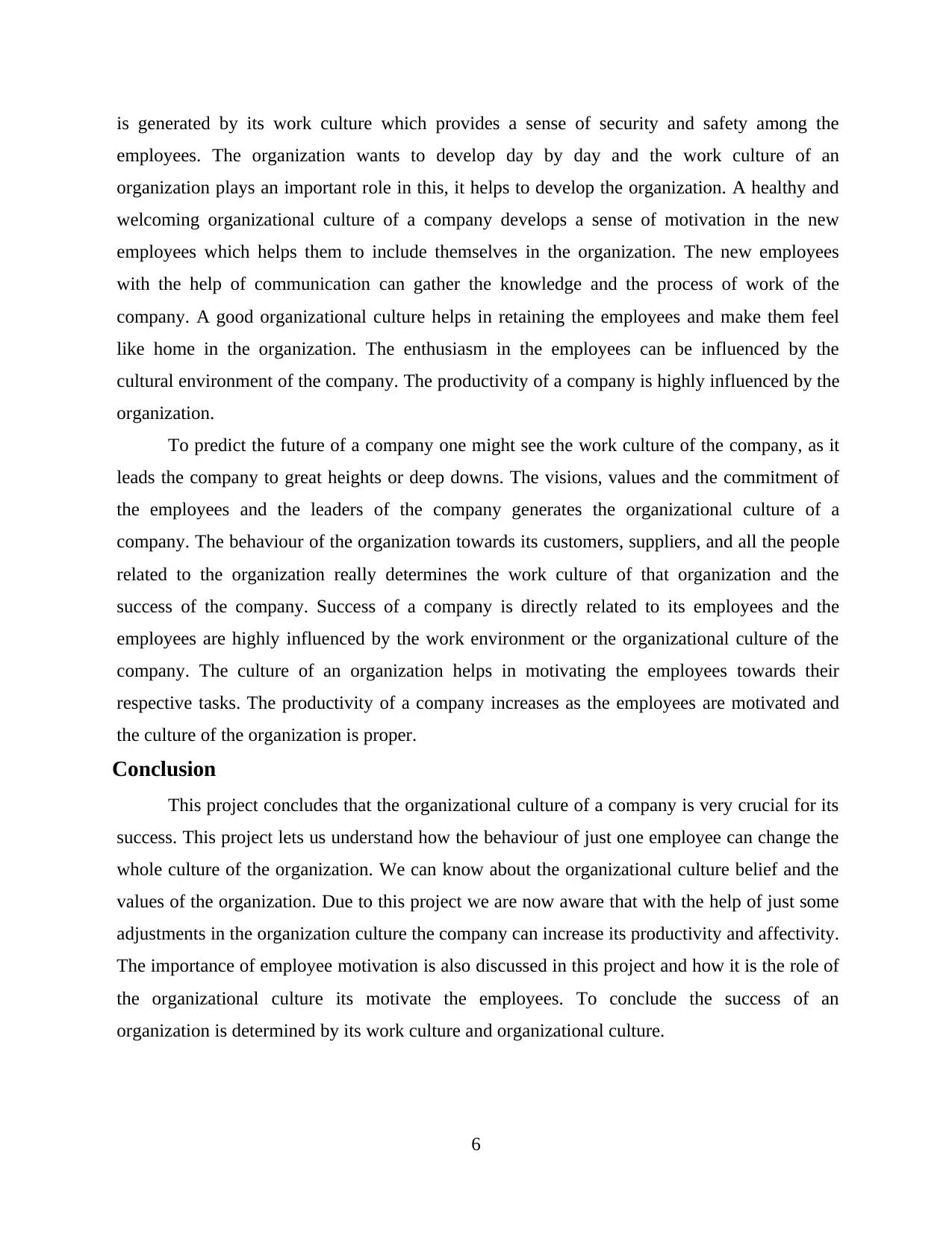
is generated by its work culture which provides a sense of security and safety among the
employees. The organization wants to develop day by day and the work culture of an
organization plays an important role in this, it helps to develop the organization. A healthy and
welcoming organizational culture of a company develops a sense of motivation in the new
employees which helps them to include themselves in the organization. The new employees
with the help of communication can gather the knowledge and the process of work of the
company. A good organizational culture helps in retaining the employees and make them feel
like home in the organization. The enthusiasm in the employees can be influenced by the
cultural environment of the company. The productivity of a company is highly influenced by the
organization.
To predict the future of a company one might see the work culture of the company, as it
leads the company to great heights or deep downs. The visions, values and the commitment of
the employees and the leaders of the company generates the organizational culture of a
company. The behaviour of the organization towards its customers, suppliers, and all the people
related to the organization really determines the work culture of that organization and the
success of the company. Success of a company is directly related to its employees and the
employees are highly influenced by the work environment or the organizational culture of the
company. The culture of an organization helps in motivating the employees towards their
respective tasks. The productivity of a company increases as the employees are motivated and
the culture of the organization is proper.
Conclusion
This project concludes that the organizational culture of a company is very crucial for its
success. This project lets us understand how the behaviour of just one employee can change the
whole culture of the organization. We can know about the organizational culture belief and the
values of the organization. Due to this project we are now aware that with the help of just some
adjustments in the organization culture the company can increase its productivity and affectivity.
The importance of employee motivation is also discussed in this project and how it is the role of
the organizational culture its motivate the employees. To conclude the success of an
organization is determined by its work culture and organizational culture.
6
employees. The organization wants to develop day by day and the work culture of an
organization plays an important role in this, it helps to develop the organization. A healthy and
welcoming organizational culture of a company develops a sense of motivation in the new
employees which helps them to include themselves in the organization. The new employees
with the help of communication can gather the knowledge and the process of work of the
company. A good organizational culture helps in retaining the employees and make them feel
like home in the organization. The enthusiasm in the employees can be influenced by the
cultural environment of the company. The productivity of a company is highly influenced by the
organization.
To predict the future of a company one might see the work culture of the company, as it
leads the company to great heights or deep downs. The visions, values and the commitment of
the employees and the leaders of the company generates the organizational culture of a
company. The behaviour of the organization towards its customers, suppliers, and all the people
related to the organization really determines the work culture of that organization and the
success of the company. Success of a company is directly related to its employees and the
employees are highly influenced by the work environment or the organizational culture of the
company. The culture of an organization helps in motivating the employees towards their
respective tasks. The productivity of a company increases as the employees are motivated and
the culture of the organization is proper.
Conclusion
This project concludes that the organizational culture of a company is very crucial for its
success. This project lets us understand how the behaviour of just one employee can change the
whole culture of the organization. We can know about the organizational culture belief and the
values of the organization. Due to this project we are now aware that with the help of just some
adjustments in the organization culture the company can increase its productivity and affectivity.
The importance of employee motivation is also discussed in this project and how it is the role of
the organizational culture its motivate the employees. To conclude the success of an
organization is determined by its work culture and organizational culture.
6
⊘ This is a preview!⊘
Do you want full access?
Subscribe today to unlock all pages.

Trusted by 1+ million students worldwide
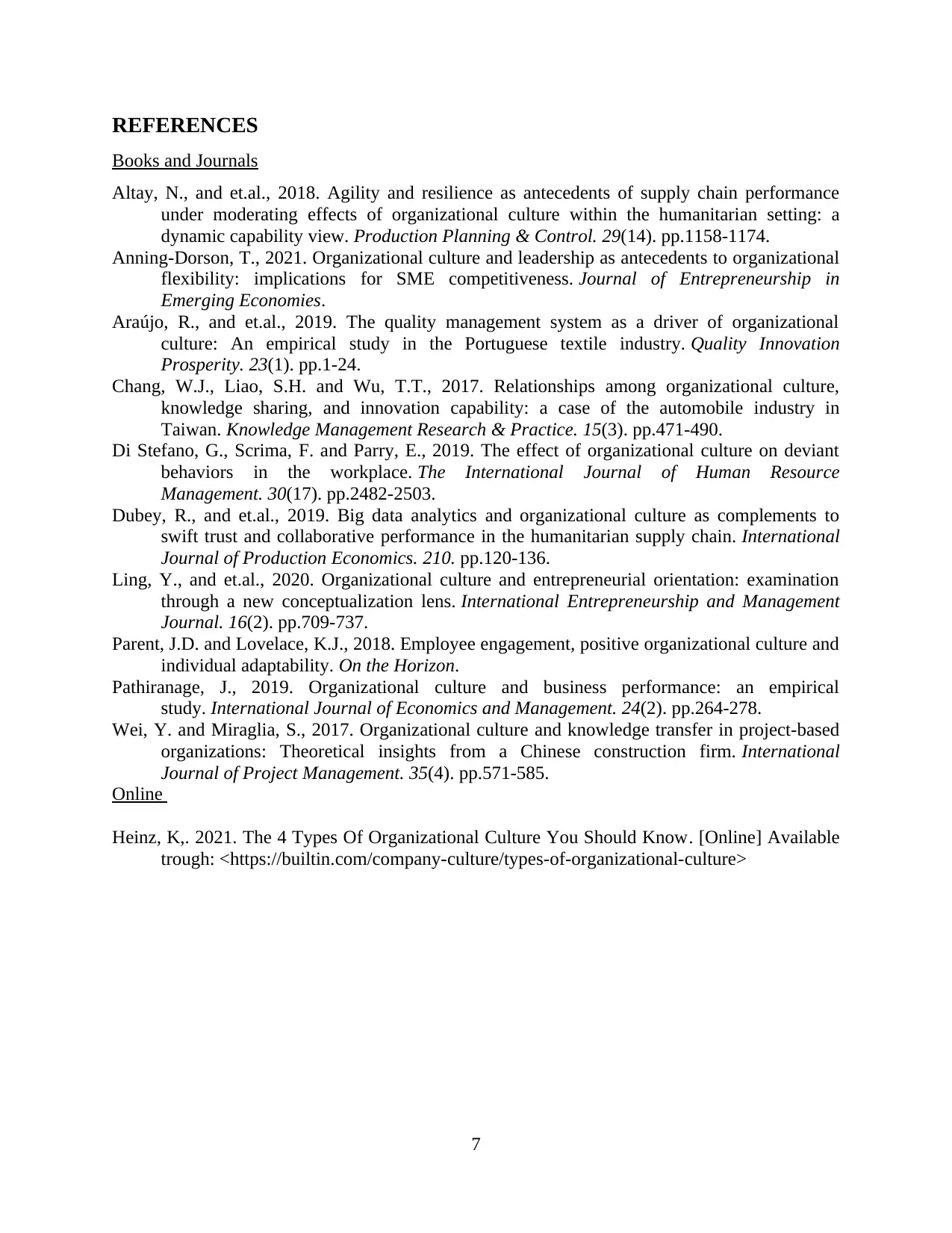
REFERENCES
Books and Journals
Altay, N., and et.al., 2018. Agility and resilience as antecedents of supply chain performance
under moderating effects of organizational culture within the humanitarian setting: a
dynamic capability view. Production Planning & Control. 29(14). pp.1158-1174.
Anning-Dorson, T., 2021. Organizational culture and leadership as antecedents to organizational
flexibility: implications for SME competitiveness. Journal of Entrepreneurship in
Emerging Economies.
Araújo, R., and et.al., 2019. The quality management system as a driver of organizational
culture: An empirical study in the Portuguese textile industry. Quality Innovation
Prosperity. 23(1). pp.1-24.
Chang, W.J., Liao, S.H. and Wu, T.T., 2017. Relationships among organizational culture,
knowledge sharing, and innovation capability: a case of the automobile industry in
Taiwan. Knowledge Management Research & Practice. 15(3). pp.471-490.
Di Stefano, G., Scrima, F. and Parry, E., 2019. The effect of organizational culture on deviant
behaviors in the workplace. The International Journal of Human Resource
Management. 30(17). pp.2482-2503.
Dubey, R., and et.al., 2019. Big data analytics and organizational culture as complements to
swift trust and collaborative performance in the humanitarian supply chain. International
Journal of Production Economics. 210. pp.120-136.
Ling, Y., and et.al., 2020. Organizational culture and entrepreneurial orientation: examination
through a new conceptualization lens. International Entrepreneurship and Management
Journal. 16(2). pp.709-737.
Parent, J.D. and Lovelace, K.J., 2018. Employee engagement, positive organizational culture and
individual adaptability. On the Horizon.
Pathiranage, J., 2019. Organizational culture and business performance: an empirical
study. International Journal of Economics and Management. 24(2). pp.264-278.
Wei, Y. and Miraglia, S., 2017. Organizational culture and knowledge transfer in project-based
organizations: Theoretical insights from a Chinese construction firm. International
Journal of Project Management. 35(4). pp.571-585.
Online
Heinz, K,. 2021. The 4 Types Of Organizational Culture You Should Know. [Online] Available
trough: <https://builtin.com/company-culture/types-of-organizational-culture>
7
Books and Journals
Altay, N., and et.al., 2018. Agility and resilience as antecedents of supply chain performance
under moderating effects of organizational culture within the humanitarian setting: a
dynamic capability view. Production Planning & Control. 29(14). pp.1158-1174.
Anning-Dorson, T., 2021. Organizational culture and leadership as antecedents to organizational
flexibility: implications for SME competitiveness. Journal of Entrepreneurship in
Emerging Economies.
Araújo, R., and et.al., 2019. The quality management system as a driver of organizational
culture: An empirical study in the Portuguese textile industry. Quality Innovation
Prosperity. 23(1). pp.1-24.
Chang, W.J., Liao, S.H. and Wu, T.T., 2017. Relationships among organizational culture,
knowledge sharing, and innovation capability: a case of the automobile industry in
Taiwan. Knowledge Management Research & Practice. 15(3). pp.471-490.
Di Stefano, G., Scrima, F. and Parry, E., 2019. The effect of organizational culture on deviant
behaviors in the workplace. The International Journal of Human Resource
Management. 30(17). pp.2482-2503.
Dubey, R., and et.al., 2019. Big data analytics and organizational culture as complements to
swift trust and collaborative performance in the humanitarian supply chain. International
Journal of Production Economics. 210. pp.120-136.
Ling, Y., and et.al., 2020. Organizational culture and entrepreneurial orientation: examination
through a new conceptualization lens. International Entrepreneurship and Management
Journal. 16(2). pp.709-737.
Parent, J.D. and Lovelace, K.J., 2018. Employee engagement, positive organizational culture and
individual adaptability. On the Horizon.
Pathiranage, J., 2019. Organizational culture and business performance: an empirical
study. International Journal of Economics and Management. 24(2). pp.264-278.
Wei, Y. and Miraglia, S., 2017. Organizational culture and knowledge transfer in project-based
organizations: Theoretical insights from a Chinese construction firm. International
Journal of Project Management. 35(4). pp.571-585.
Online
Heinz, K,. 2021. The 4 Types Of Organizational Culture You Should Know. [Online] Available
trough: <https://builtin.com/company-culture/types-of-organizational-culture>
7
1 out of 10
Related Documents
Your All-in-One AI-Powered Toolkit for Academic Success.
+13062052269
info@desklib.com
Available 24*7 on WhatsApp / Email
![[object Object]](/_next/static/media/star-bottom.7253800d.svg)
Unlock your academic potential
Copyright © 2020–2026 A2Z Services. All Rights Reserved. Developed and managed by ZUCOL.




